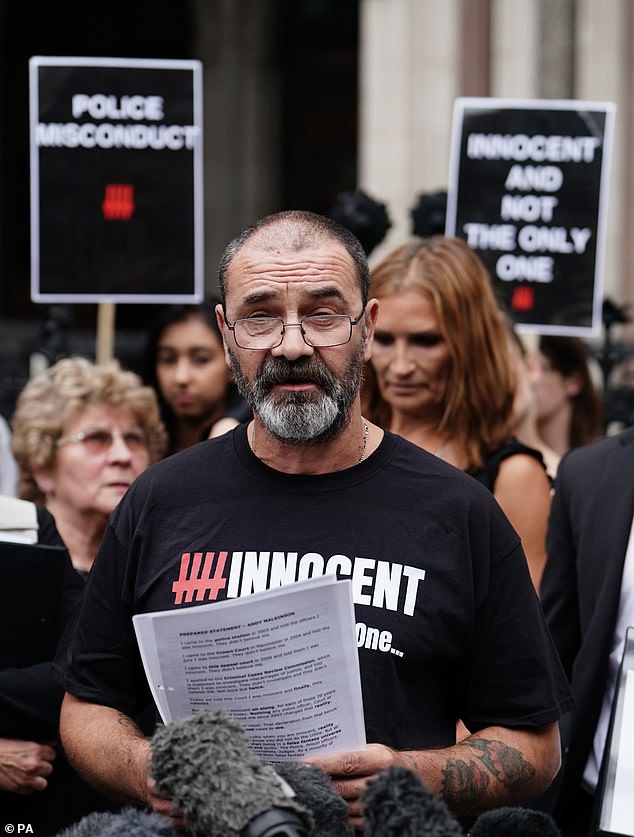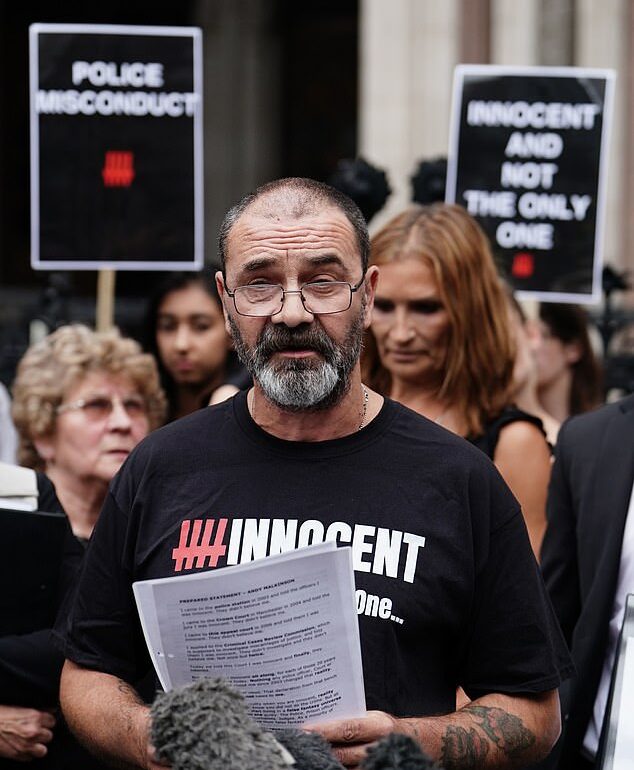PETER HITCHENS: We need a serious debate about the death penalty – but not while our criminal justice system is a shuddering jalopy quite unfit for its job
Yes, we should bring back the death penalty. No, we could not actually use it. In fact, the condition for restoring capital punishment (a desirable and civilised aim) must be a total reform of our police, prosecution service and our courts.
For our criminal justice system as it stands is a shuddering jalopy, simultaneously weak and cruel, dangerous to the innocent and quite unfit for its job. Both things together — a death penalty and justice reform — would make this a much better country.
But it would be deeply unwise to allow any judge to condemn anyone to death with things in their current state. And it would be deeply dangerous to carry out any such sentence.
Our police are sloppy, absent and penetrated by the ideologies of the cultural Left.
The appalling case of Andrew Malkinson, buried alive for 17 years because he bravely refused to accept a wrongful conviction for rape, should never cease to haunt us if ever we are tempted to think that nothing can go wrong.

I am increasingly unimpressed by our judges, especially since the Blair government launched the Judicial Appointments Commission in spring 2007.
Was it possible they were trying to make the justice system less conservative and more politically driven? I couldn’t possibly say.
Most important of all, our juries have been eviscerated. Teenagers without experience or knowledge now sit on them and could help ruin your life in an afternoon.
If plans for voting at 16 go through, as they already have in Scotland, that also means 16-year-old jurors. Had you thought of that?
The old safeguard of a unanimous verdict has been abolished, so that the events depicted in that great film Twelve Angry Men cannot now happen in this country.
A tough-minded, doubtful individual could once stand against a rush to convict and argue the other jury members round. Now he or she cannot.
You must not think from this that I believe the death penalty is impossible because of the remote risk of a mistaken conviction. On the contrary.
I think we should do all we can to reduce that risk, but we cannot totally disarm ourselves against the wilful evil of heinous murderers.
The courts defend the weak and the innocent against such menaces just as our Armed Forces defend the peaceful people of this country against would-be invaders. They deter them from attacking in the first place and they use lawful violence against them when deterrence fails.
If we actually had a rule that we could not follow any policy, however beneficial or civilised it was, because of the remote possibility that an innocent person would die as a result, we would have to disband those Armed Forces.
For everyone with any military knowledge understands that innocents are bound to die in modern warfare. Many British people (I wasn’t one of them) applauded the NATO bombing of Serbia during the 1998-99 Kosovo crisis.


In fact, as I recall, Left-wing liberals were very keen on it. They still are. Yet innocents died, quite predictably, including the make-up lady at Serbian TV HQ in Belgrade.
Human Rights Watch recorded that ‘Some 500 Yugoslav civilians were killed in 90 separate incidents over 78 days of bombing’, though they stated that this total might be incomplete.
Another policy which Left-wingers support is the one that says that even convicted murderers should sometimes be released, rather than being locked up till they die. This is of course a humane policy and often has no harmful outcomes. Often, but not always.
Alas, roughly every three years two such released murderers take advantage of their liberty to kill again. Their victims are of course innocent deaths, avoidable deaths resulting directly from a settled government policy.
This is more or less a statistical certainty. Yet we continue with the release policy. If The Justice Department truly believed that any policy which might lead to innocent deaths was ruled out, life sentences would always mean life.
So why is the death penalty worth having? Opposition to it is now so fashionable that the hard arguments are little-known.
It cannot prevent or deter all murders. Nobody has ever claimed it could. But it deters certain types of criminal behaviour, especially the carrying of guns and knives by criminals.
In this country, the penalty was twice suspended, while Parliament debated its abolition, in 1948 and 1956.
During both periods of suspension, armed and violent offences rose. After both attempts to abolish hanging failed, such offences fell again.
These facts were researched by a retired police officer, Colin Greenwood. Some American researchers suggest that the sort of murder which has increased since abolition is so-called ‘stranger’ murder, for example, the killing of a woman by her rapist, or of a petrol station attendant by the man who has robbed him.
Comparisons of the murder rate before abolition with now are difficult. It is probable, but hard to prove, that many homicides which would have been tried and convicted as murders 60 years ago are now listed as manslaughter.
And huge improvements in urgent medical care mean many who would have died of wounds 60 years ago now survive. Such cases, attempted murders and woundings with intent to kill, have greatly increased in recent years.
Some time ago a leading Home Office pathologist, Prof Bernard Knight, explained ‘The woundings that happen now would have been murders then.
‘If you look at the rise in the murder rate it is very small, but look at the wounding figures and the graph goes up 45 degrees. If that number of woundings had occurred years ago the murder rate would have been massive.’
Nowadays people sometimes even survive being knifed through the heart.
We are also told that the death penalty does not work in the USA. That is because — while it gets a lot of coverage here — it barely exists in practice.
In reality it is political street theatre, in which a tiny few murderers are executed, usually long after their crimes, to make politicians look tough.


Bill Clinton famously interrupted his Presidential campaign in 1992 to very publicly oversee the execution of the police killer Ricky Ray Rector in Arkansas, where Clinton was then governor.
The crime had been committed almost 11 years before, and Rector was mentally impaired because he had turned the gun on himself after shooting Officer Robert Martin and another man.
Many believe Clinton’s action helped him win the White House, overcoming a widespread and correct view that he was in fact a Left-wing liberal.
No US state really has the death penalty in practice. Even Texas, which comes closest, still fails to execute the great majority of its convicted murderers, who fester for decades on death row. In 2018, Texas suffered 1,322 murders, yet executed only 13 killers.
Most states which formally have the penalty on their books seldom or never apply it.
Louisiana, in theory a death penalty state, suffers about 500 murders a year. Its last execution was in fact in January 2010.
We could have a serious debate about this one day, but at the moment it is far too dominated by liberal prejudices and excuses.
In the meantime let us get the police and courts sorted out, so that they are once again fit to dispense serious justice.
This post was originally published on this site be sure to check out more of their content.







